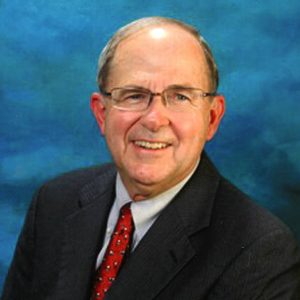calsfoundation@cals.org
Howard Walter Brill (1943–)
Howard Walter Brill, a professor of law at the University of Arkansas (UA) in Fayetteville (Washington County), earned a national reputation as an authority on legal ethics and served sixteen months, in 2015 and 2016, as chief justice of the Arkansas Supreme Court. His 1986 book, Arkansas Professional and Judicial Ethics, and seven subsequent editions dictated the state’s regulation of the conduct of lawyers and judges for more than a generation.
Howard Brill was born on October 18, 1943, in Englewood, New Jersey, across the Hudson River from New York City. His parents, Edwin Lois Brill Jr. and Catharine Linsmann Brill, were born in the Bronx and married there but moved across the river to New Jersey before Howard and a younger sister were born. Brill’s father assembled telephones on an assembly line for Western Electric at Englewood until he was transferred to Bennington, Vermont, where he became a telephone lineman and then a door-to-door vacuum-cleaner salesman for Electrolux.
When Brill was eleven, the family moved to Daytona Beach, Florida, where his father continued to try to sell vacuum cleaners, unsuccessfully. He finally got into the more lucrative business of selling and fitting hearing aids. After graduating from high school in 1961, Brill enrolled at Duke University at Durham, North Carolina, but he was expelled at the end of his first semester for plagiarism, because a professor of religion thought he had not given proper credit to a source for some of the material in his term paper on the Maccabean Revolution. He was readmitted after one semester and completed his baccalaureate degree in history and political science with the other members of his freshman class.
After graduation, Brill entered the Peace Corps and spent two years and four months teaching English, literature, and African history in a residential school for boys in the town of Sokoto, a provincial capital in the predominantly Muslim region of northern Nigeria. Nigeria was still a British colony at the time. He spent some time helping build housing in a leper colony in the jungle south of the Sahara Desert. He traveled overland around central and southern Africa; climbed Mount Cameroon, the highest mountain in Africa, and Mount Kilimanjaro; and journeyed to Timbuktu and South Africa. He left Nigeria in December 1967 as the country devolved into civil war.
In the spring of 1968, Brill enrolled in law school at the University of Florida at Gainesville. He dropped out in March 1969 and taught world geography at a high school at Live Oak, Florida. He returned to law school and received his law degree in 1970. He married Katherine Price, whom he had met in law school. They had two sons and a daughter.
Brill first was law clerk to a state appellate judge at Lakeland, Florida, for a year, and spent one-year stints teaching legal writing at the University of Florida and the University of Illinois at Champaign, where he also obtained a master of law degree. He practiced law for a while with a small firm in Rock Island, Illinois.
He accepted a job teaching at the University of Arkansas School of Law in Fayetteville in July 1975, joining a faculty that included Bill Clinton, the future governor and president; Hillary Rodham, the future first lady, U.S. senator, and secretary of state; Steve Clark, the future attorney general of Arkansas; and David Newbern, later a justice of the Arkansas Supreme Court. One of his first assignments was to teach professional responsibility, or legal ethics, which would become his scholastic forte. He became the first Vincent Foster Professor of Legal Ethics and Professional Responsibility. He also taught civil procedure, remedies, domestic relations, Arkansas constitutional law, and special topics like “baseball and the law.” For fifteen years, he was the faculty athletics representative to the Southeastern Athletic Conference (SEC) and the National Collegiate Athletic Association (NCAA).
In August 2015, Chief Justice Jim Hannah, who was suffering from cancer, retired, and Governor Asa Hutchinson appointed Brill to complete his term. Previous governors had appointed Brill as a special justice to hear appeals in three cases. Hutchinson seemed to hope that the distinguished professor might bridge the deep division on the court that followed its default on a lawsuit challenging the constitutionality of the state law barring marriages of same-sex couples. The court avoided a decision on the appeal until the U.S. Supreme Court declared that the equal-protection clause of the U.S. Constitution allowed same-sex couples to be married. It then dismissed the appeal. For the sixteen months under Brill, the internal strife continued but never erupted publicly.
Brill’s opinions on the court were notable for their occasional citations from the works of musicians Johnny Cash and Bob Dylan and the Irish poet William Butler Yeats. The court under Brill strengthened the rules governing the conduct of lawyers and judges.
In January 2017, Brill returned to teaching at the UA law school. On November 4, 2021, Gov. Hutchinson appointed Brill to serve as a special Supreme Court justice to hear the appeal of a court ruling that blocked the enforcement of a law preventing schools from requiring that students and staff be masked as a result of the COVID-19 pandemic.
For additional information:
Interview with Howard Walter Brill. Arkansas Supreme Court Project. Arkansas Supreme Court Historical Society. https://courts.arkansas.gov/sites/default/files/Brill%20transcript-real%20final.pdf (accessed November 8, 2018).
Polikoff, Rich. “Howard Walter Brill: Game for Law.” Arkansas Democrat Gazette, November 20, 2011, p. 39.
Ernest Dumas
Little Rock, Arkansas
 Divergent Prosperity and the Arc of Reform, 1968–2022
Divergent Prosperity and the Arc of Reform, 1968–2022 Education, Higher
Education, Higher Law
Law Howard W. Brill
Howard W. Brill 



Comments
No comments on this entry yet.